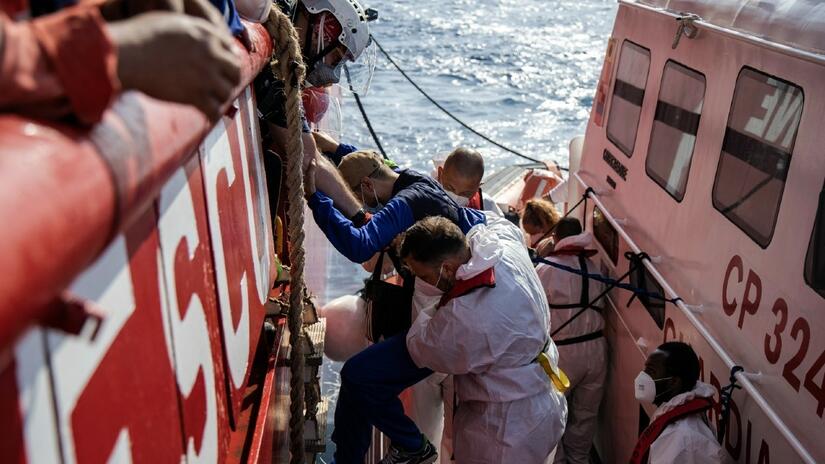Global Route-Based Migration Programme
Our Global Route-Based Migration Programme aims to save lives and improve the safety and dignity of migrants, refugees, and other displaced people along dangerous and deadly migratory routes.
About the programme
Across the globe, people on the move—migrants, refugees, asylum seekers and other displaced people—make dangerous and difficult journeys in search of safety or a better life.
Whether on land or at sea, people on the move face significant risks to their lives, dignity, and rights. Many people on the move die, go missing or experience abuse. And they often encounter barriers limiting their access to essential needs such as food, water, shelter, information and health care.
The IFRC has a long-standing commitment to working with, and for, people on the move. For decades, our global humanitarian network has provided life-saving services to the most vulnerable, advocated for their needs and rights, and improved their access to longer-term support.
Our Global Route-Based Migration Programme brings together all of this work, experience and commitment.
It is a multi-year, global programme to improve the safety and dignity of people on the move along land and sea-based migration routes in Africa, Europe, Middle East and North Africa and the Americas.
The programme aims to support 4.7 million people on the move and people in host communities annually by combining the reach and expertise of 57 Red Cross and Red Crescent Societies around the world. Their local presence in countries of origin, transit and destination, as well as their auxiliary role to government authorities, means they are uniquely placed and trusted to respond to the needs of people on the move.
Through better coordination, collaboration, and sharing of expertise and lessons within and across borders, the programme will strengthen support to people on the move throughout their journeys.
What does the programme focus on?
Improving direct access to support
We are improving access to humanitarian assistance and protection for people on the move along migration routes, including through Humanitarian Service Points.
Strengthening local actors
We are strengthening the local and national capacities of Red Cross and Red Crescent Societies to provide humanitarian assistance and protection to people on the move.
Advocacy and diplomacy
We are undertaking local and global diplomacy, encouraging policies and practices that facilitate assistance and protection to people on the move.
More information
Which National Societies are involved?
See the full list of Red Cross and Red Crescent Societies involved in the Global Route-Based Migration Programme.
What are the funding requirements?
See our detailed funding requirements for the Global Route-Based Migration Programme.
Saving lives in the Central Mediterranean

IFRC and SOS MEDITERRANEE crews on board the Ocean Viking search and rescue ship assist six survivors to cross onto an Italian Coast Guard vessel in order to be evacuated for urgent medical treatment in September 2021
Photo: SOS Mediterranee/Laurence Bondard
The Central Mediterranean migration route from North Africa (primarily Libya, but also Tunisia and Algeria) to Italy is one of the most active and dangerous routes for people crossing to Europe by sea.
The IFRC is operating a Humanitarian Service Point in the Central Mediterranean in partnership with SOS Mediterranée. Together, we're reducing human suffering and preventing loss of life through a fully able-to-assist rescue ship.
SOS Mediterranée focuses on the search and rescue side of the operation, while IFRC teams on-board provide humanitarian assistance (such as health and psychosocial support, food, water and information) to people rescued.
Click here to read more information about this work. And visit IFRC GO, our emergency operations data platform, to see real-time data on the operation—including the number of people rescued to date.
